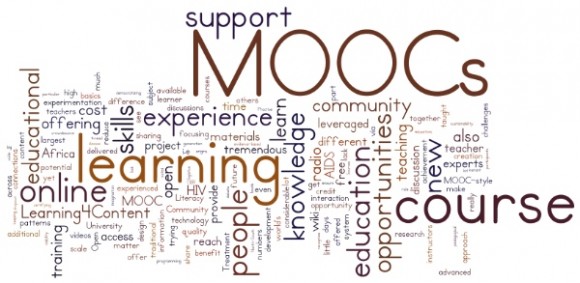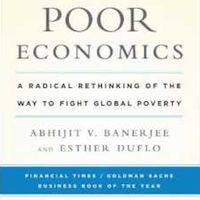With a day job dedicated to preaching the virtues of education - and how it should improve, I recently felt obliged to get my hands 'dirty' once more and enrolled on a Massive Open Online Course (MOOC) to see what all the fuss was about. If Khadijaah Niazi, an 11 year old girl from Lahore could enroll and pass a Udacity Physics course (a Stanford University spin-off), what was I afraid of?

Random control trials and the behaviour of the poor sounded interesting, so without cost or hassle I quickly enrolled on the MOOC: The Challenges of Global Poverty run by the edX consortium of MOOC's, with 'celebrity' professors Duflo and Banerjee (authors of Poor Economics) from the Jameel Abdul Latif Jameel Poverty Action Lab, Massachusetts Institute of Technology (MIT) leading the course.

With a fairly slow broadband connection at home, I found myself staying up late 1 or 2 evenings a week to read the fascinating online material (e.g. Why do some people starve themselves to buy TVs or not bother to get kids vaccinated?), watch YouTube videos (complete with script) and attempt quizzes that pass for homework in collaboration with 35,000 other students around the globe. Not having to write essays was a big plus, but the multiple choice questions set were searching and the bulletin boards posted showed fellow student's desperate pleas for help and occasional hints. I presume the moderators stop obvious cheating - I haven't encountered any answer sharing online!

Despite conflicting international travel and some tired early mornings I'm over the hump and should finish in a few weeks. In theory I will have 12 credits to a degree, although this is where the business model will kick-in as the MOOC organizers try to convert mass online activity into profit, for example by charging for accreditation and certificates that accumulate to recognized qualifications.
Will MOOCs revolutionise the delivery of tertiary education in developing countries like Tanzania? This is a question of great interest, can they bypass the financial and bureaucratic challenges faced by poor but capable, intelligent students? I hope so! This is the sort of initiative that DFID may support in the future, internally we're crystal ball gazing to understand the trends across the whole spectrum of development and ensure we have the necessary ideas, tools and skills to respond to such challenges in the future.
In Tanzania COSTECH the government technology and innovation agency is partnering with the World Bank to launch a MOOC using content from 1 of the major new providers Coursera. It will focus on IT skills and knowledge, seeking to support college students to become employable – a common complaint is that current Tanzanian school and college graduates lack the rounded skill-set that employers seek.
I feel it is likely that there will need to be a lot more adaption of content, delivery models and support mechanism to realize these benefits. Internet access is erratic and expensive, but perhaps more of a barrier will be language and cultural issues for students who may be unaccustomed to student centred, but independent and at the same time collaborative, learning.

5 comments
Comment by Colin Bangay posted on
Thoughtful blog Ian. Moocs and the internet offer free intellectual content from the top universities around the world (see iTunes U). Potentially they democratise learning and circumvent national regulations that impede 'overseas' courses. The key issue is around the business model and certification. Certificates can be seen as where learning is transferred into 'workplace currency' for the individual. Qualifications are a starting point for access to jobs. Issuing certificates is where these Uni's can recoup their investment. However, there are challenges over certifying the bone fide credentials that the person awarded the certificate was the person who sat the course. Presumably biometrics will come up with a solution for that shortly. Will be interesting to see how 'disruptive' this becomes. In particularly what will happen to Uni's in developing countries. Will they become 'franchises' for the global brand leaders, fade away, or compete in niche markets ?
Comment by Robert McGuire posted on
We're interested in the questions you're asking, too, at MOOC News and Reviews. The tech and language barriers are critical to tackle to realize the full potential of MOOCs. But part of me wonders if what happens next is the bigger question. MOOCs have already expanded access to education tremendously, despite these barriers. (You may have also seen the story about Khadijah not being able to access the course videos during exam time and how classmates around the world rallied to her assistance.) Now that capable intelligent students in Tanzania and elsewhere are bypassing financial and bureaucratic challenges, what happens next? MOOCs put to test the theory that education pays off, regardless of credentials and degrees. Will the marketplace recognize and reward the education those capable and intelligent students are getting for themselves? When a student like that, without a traditional degree or credentials, is able to use their education in the marketplace in meaningful ways, then we'll know that MOOCs have tremendous potential for transformation. If you hear of examples of that -- or have advice for those students on how to connect those dots -- please let us know
Comment by Jane Applebee posted on
Hi Ian, enjoyed your post - thanks for linking it. I am one of your Global Poverty 14.73x classmates, feeling alternatively triumphant and sad after finishing the last homework earlier this evening.
I teach middle and high school students in California where a bill is now wending through the legislature which will require the state university system to accept particular MOOC certificates (there is a list... somewhere) for credit. The University of California in the last week has intimated that the bill will not pass without a fight.
At my school we will be, for the first time, accepting completion certificates for credit for independent study students this semester. (One of my 10th graders is doing superbly well in the Harvard Justice Course and is very enthusiastic about a Coursera class in Public Health Policy... which is a mystery and wonder to me.) He is also working through programming lessons at Code Academy - this is a kid with a sick single mother and absolutely no funds for anything beyond bare necessities in life. I only wish the technology had been extant when I was his age.
Comment by Anaeli Kihunrwa posted on
Great post Ian.
Deeply inspiring and timely as well.
Despite the language barrier, MOOCs do accelerate learning, and provide one important experience that is hard to find in classes of most developing countries - learning through experimentation and discovery. And for years, this has inspired our work in the local education sector in Tanzania, MOOC resources playing a crucial role.
As a Tanzanian multimedia specialist, involved in developing interactive 3D and animated content for local education sector for over 5 years now, I think McGuire has raised a crucial point -- 'being able to use the(ir) education in the marketplace in meaningful ways'.
Our company is doing that just now, but faster, better and more confidently, thanks to great resources from spaces like Udacity. Currently, we are in the process of transforming learning experiences for young people in Tanzania through interactive multimedia experiences delivered to computers, mobile devices and compact disks. For us, in a case of interactive learning experiences for young people, our key challenge (since 2008) was not in production of customized multimedia content (such as 3D animations, Virtual reality, etc) - this we could manage. But environmental and infrastructural factors such as poor speed of internet connections, along with other market bottlenecks, impeded our ability to work-on opportunities in education sector sustainably.
When a number of new web standards able to support all learning experiences we desired was released in 2012, our challenge was to rapidly gain reasonable mastery of the nuts and bolts of its inner working so we could reach students, schools and teachers efficiently. MOOCs lectures (such as Udacity's interactive Web3d applications...) facilitated (and continues to do so) our speedy discovery into the underlying technical makeup of this new maturing set of standards. This knowledge, that we couldn't have got locally, to such depth, enables growing companies such as ours, to pioneer development of interactive multimedia applications for education, and team up with organisations (such as Tanzania Institute of Education) to deliver great learning experiences to young people in Tanzania using new technologies that are customized for local audiences.
I think as time progresses, MOOC resources will continue to plant 'knowledge seeds' to many in developing countries including Tanzania - for those with access to good internet connection and drive to complete the courses. Language and technology barriers may hinder or slow down penetration of MOOCs in poor communities, but one can not underestimate the resolve of those with deep hunger for education and development.
Comment by Ian Attfield posted on
Thanks for some excellent and informed comments, I'm please to annouce I've finally finished this MOOC with I believe a 95% pass, although still awaiting the e-certificate!
DFID are actively considering how we can support MOOCs and the like to harness and deliver flexible learning of the best latest contents to deveoping world students and drive both growth and prosperity at the micro and macro levels.
Aneili, great to hear at first hand how you company is benefiting in Tanzania, I know their has been teething problems with the WB support UDACITY pilot in Tanzania, hope its moving now!